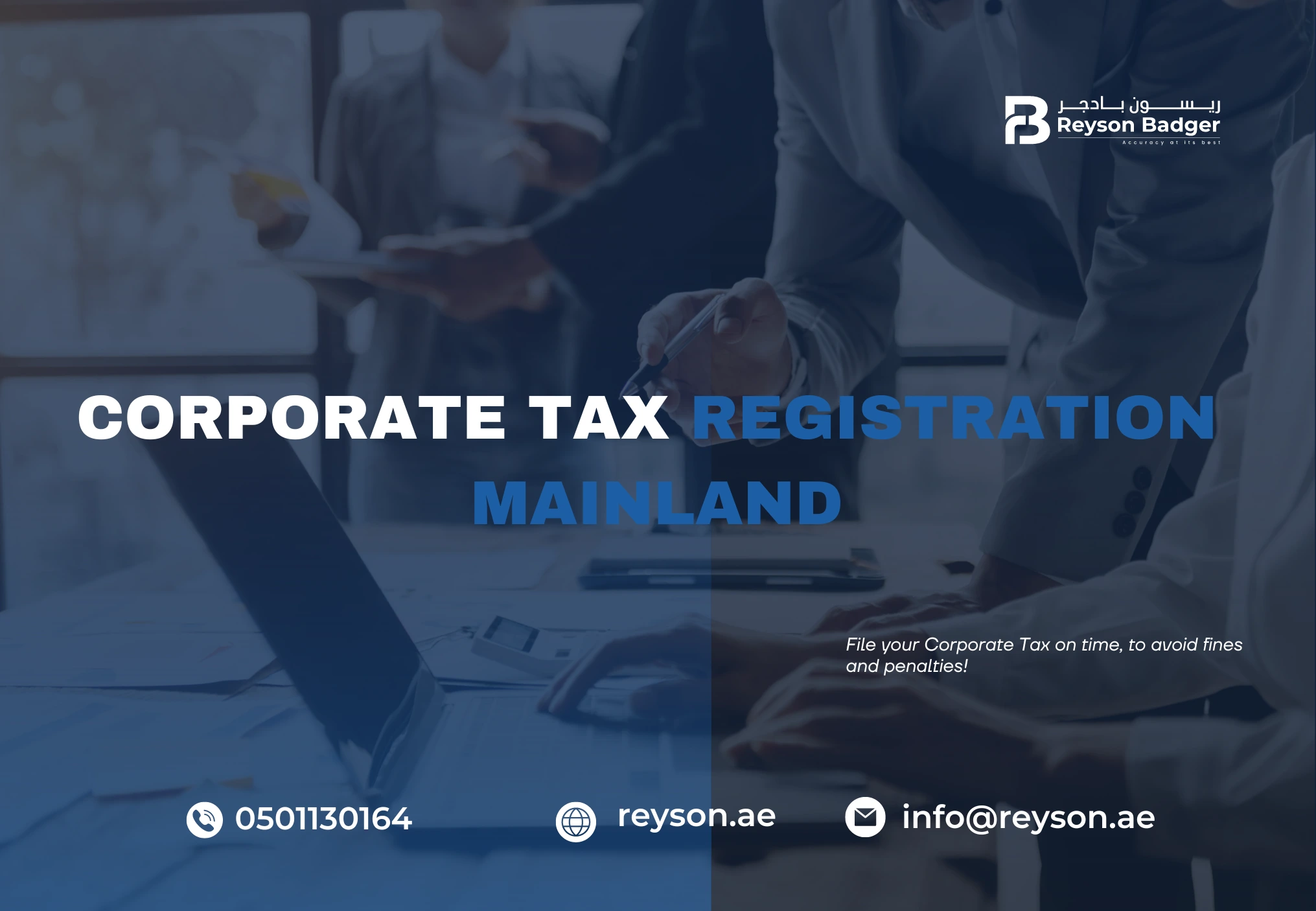
The UAE had to introduce corporate tax in its efforts toward global standards and norms of international taxation, as well as enhancing the fiscal system within it. Corporate tax is charged on business income so that an entity contributes to its economy while being subjected to a regulatory mechanism of international money flow norms. A corporate tax regime that is being exercised in the UAE is competitive because it charges tax rates fairly attractive to investments while being transparent and compliance-oriented.

Corporate tax registration, therefore, is important for any mainland company in the UAE to maintain legal compliance. This way, they not only comply with the nation's regulations but also do business transparently and credibly. Companies thus avoid legal penalties, demonstrate financial responsibility, as well as access international tax treaties and benefits.
The mainland companies operating in the UAE are registered by DED in each emirate, which allows the company to operate both within the country and globally without restrictions that limit the businesses of free zones or offshore companies. These companies are an important component of the United Arab Emirates economy as they can undertake any type of business inside the UAE as well as outside the country. From this perspective, mainland companies are subjected to federal laws of the country wherein they have their base of operation and thus totally conform to national financial standards on corporate tax regulations.
The tax rate in the UAE was designed to be competitive with supporting small businesses. Under this regime, taxable income up to AED 375,000 is taxed at a nil rate to encourage start-ups and small enterprises. Taxable income over AED 375,000 shall attract a tax rate of 9%. Multinational corporations that earn revenues across the globe to an amount greater than €750 million may pay tax at other rates based on a new structure that the OECD is outlining, Pillar Two, to ensure the fair tax treatment of global enterprise.
These include LLCs, public and private joint-stock companies, and branches of foreign companies that conduct business and generate income in the UAE. The sole establishments or civil companies would also be included if their income is above the taxable threshold. The company tax on partnerships would depend on their kind. Nevertheless, sectors like extractive industries or government institutions are exempted; however, they still undergo the registration process to declare themselves exempted.
In the UAE, corporate tax registration is important to all the mainland businesses in qualifying companies. A mainland business has to file with the Federal Tax Authority (FTA) if it performs any form of commercial, industrial, or professional activity and receives taxable income. This includes a wide scope of companies, such as Limited Liability Companies, public and private joint stock companies, as well as foreign branches. Even small entities like sole establishments and civil companies may have to register if their income exceeds the taxable threshold of AED 375,000.
Eligibility for the Companies of Mainland
The Mainland companies whose taxable income is above AED 375,000 are required to get registered for corporate tax. The companies need to meet their obligations before the UAE's corporate tax act by making a registration. The requirements are as follows:
Exemptions (if any)
Mainly, most companies in the mainland require corporate tax. Nevertheless, there are a few organizations that are exempted from this form of taxation. For example:
Even as there are exemptions, qualifying entities must register with the FTA and submit documents for exemption status
Corporate tax registration in the UAE is mandatory for mainland companies subject to certain legal and financial criteria. Identifying the limits of who needs to be registered and what the threshold for which a company would have to pay taxes is critically important for compliance.
Entities Legally Required to Register
The mainland companies that exist in the UAE and carry on business will be liable for corporate tax. In general, the following types of legal entities have to register:
Turnover Thresholds and Tax Liability
Corporate tax in the UAE is going to be charged on annual turnover:
Firms earning more than AED 375,000 tax revenue annually have to register for corporate tax, and any income beyond AED 375,000 will attract a 9% corporate tax levy.
Exemptions and Exclusions (if any)
Most of the mainland companies are required to register, but there are some exemptions from corporate tax. The most critical kinds of exemptions are:
In this case, despite the exceptions, affected entities are still compelled to subject themselves to the registration process, declaring their exemption status. This means that there is full transparency with the FTA.
Step-by-Step Process for Mainland Corporate Tax Registration in UAE
To register for corporate tax with the FTA, mainland businesses must therefore follow clearly defined procedures offered within the UAE's corporate tax law. Hereunder is a step-by-step process for mainland corporate tax registration.
1. Pre-Registration Requirements
A business is expected to have obtained the following before starting with the registration process:
2. Online Registration on the FTA Website
The FTA website of the UAE makes it easy to have a registration for corporation tax as follows:
Step 1: Accessing the FTA Website
Log in to the Federal Tax Authority website and create an account on the site, in case one already does not own an account.
Step 2: Log in to your FTA Account
Log into the FTA account then go to the registration section of the FTA website, on this portal that deals with corporate tax.
Step 3: Provide Your Business Details
Provide the following details:
Step 4: Provide Financial Information
Provide your company's annual revenue and taxable income.
Step 5: Upload Supporting Documents
Upload supporting documents such as a copy of the trade license, Memorandum of Association, and audited financial statements when required.
3. Documents required for registration
Businesses must provide the following documents when registering for corporate tax:
4. Timelines and Important Deadline
Important Dates:
1. Total Revenue
Calculate the total income earned by various business activities carried out within the UAE borders. These may include income from sales, services, and other streams as well. For accurate reporting, ensure there are no deficits or surpluses while reporting. Therefore, make sure to keep them zero as disparities may attract penalties.
2. Deductible Expenses
List all the expense heads that qualify as deductions. The heads include operating expenses, wages, rent, utilities, etc. Such deductible expenses should strictly relate to business activities and comply with UAE tax requirements.
3. Calculating Taxable Income
Deduct all allowable, deductible expenses from total revenue. That amount is the taxable income that applies for purposes of taxation in UAE corporate taxes.
4. Corporate tax rates
Applying the corporate rate of tax stated in the UAE tax regulations to the taxable income. Note that the rate will not be flat and there may be certain thresholds which are subjected according to the kind of business and revenues.
5. Tax Exemptions and Deductions
Familiarize yourself with exemptions specific to certain sectors of the economy and the deductions allowable by the UAE government, as a way of facilitating economic growth and investment in certain industries.
6. Return Filing and Payment
Due Dates Acquaint yourself with UAE corporate tax return filing and payment due dates to ensure timely return fillings. Filling or Payment after the due dates will incur penalties, and compliance costs will be increased.
7. Avoid Penalty of Non-Compliance
Non-compliance will cost a good size penalty. Ensure all your activities in taxes are properly aligned and conforming with UAE tax legislation, which should include proper reporting and accounting, documentation, and proper submission on time.
1. Timeline to Register as Function of the License Date of Issue
2. Filing deadlines for tax returns and payment schedules
3. Specific Provisions for Newly Setup Organisations
1. Common Problem Areas of Business
2. Importance of keeping up with changes in the tax policies and laws of UAE.
3. Role of Tax Consultants and Accountants in Compliance and Optimization of Tax Liability
Need help with registration? Check out A quick guide to corporate tax on mainland and free zones
Choosing our services for mainland corporate tax registration offers you a seamless and efficient experience. Reyson Badger provides expert guidance through every step of the registration process, ensuring compliance with UAE laws and regulations. Our knowledgeable team stays updated on the latest tax regulations, helping you maximize benefits from tax treaties and enhance your business credibility. With our support, you can focus on growing your business while we handle the complexities of corporate tax registration. Partner with us for a smooth, reliable, and professional registration process that aligns with your business goals.